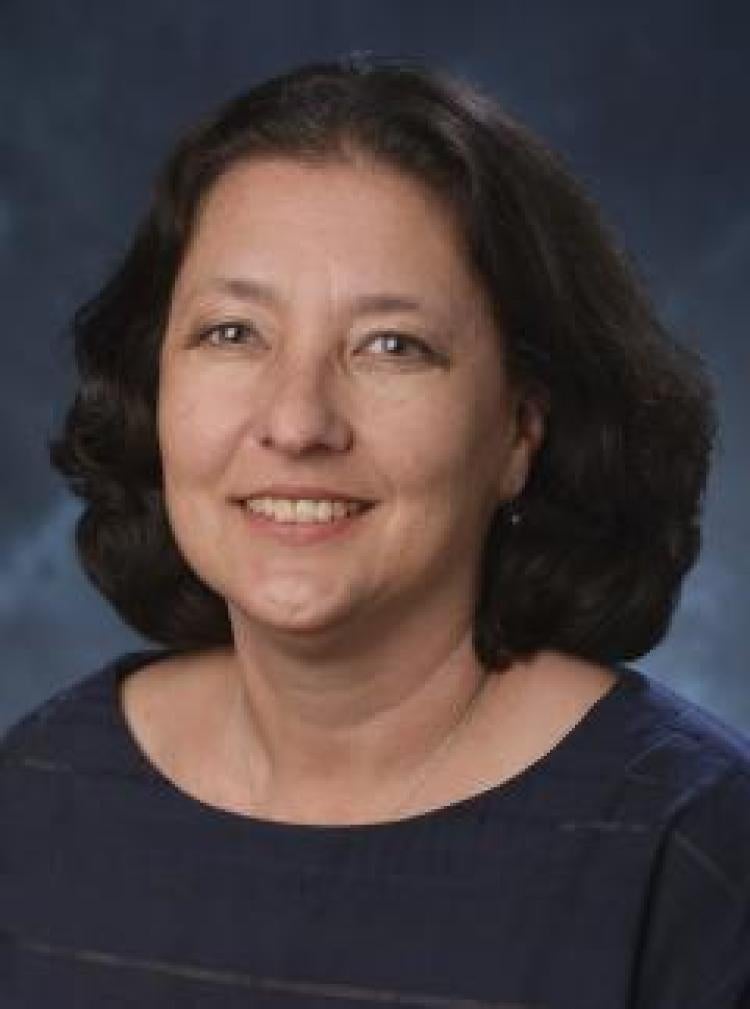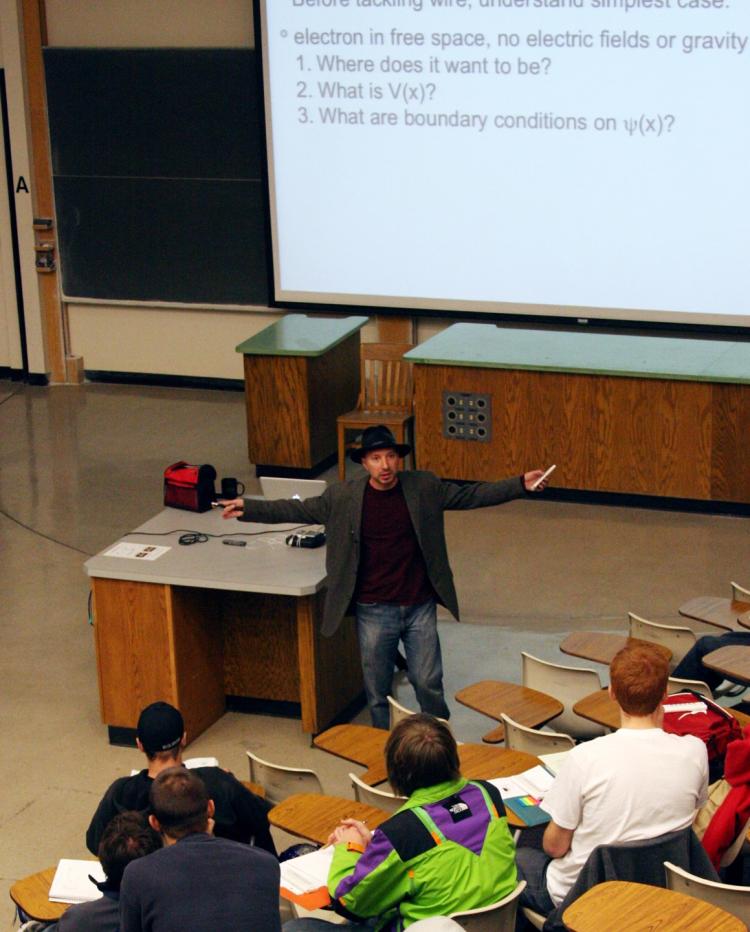Striving to help women feel they belong in physics
'We recognize that learning is a social act, and we are creating social structures where we want people to build a sense of belonging in this enterprise'
By creating a sense of belonging for women in physics, the University of Colorado Boulder is helping female students succeed, experts in the field say.
“Flipping” classrooms, endorsing hard work over innate ability and creating positive social connections in and outside the classroom are all contributing to students’ success, they add.
With increasing concern about the gender gap in STEM education (science, technology, engineering and math), researchers are examining sociocultural factors that could help explain this disparity.
In 2012, only 39 percent of bachelor degrees in the physical sciences were awarded to women, compared to more than 50 percent of women earning bachelor degrees in biological sciences.
CU Boulder researchers in physics and psychology lay out the case for how to attain parity in a recently published journal article titled, “Fitting in or opting out: a review of key social-psychological factors influencing a belonging for women in physics.” The researchers noted that women who left STEM majors reported “feeling like outsiders in the traditionally male-centered culture in STEM.”

Tiffany Ito
Tiffany Ito, a professor of psychology and neuroscience at CU and one of the article’s authors, says a low sense of belonging could be contributing to fewer women in physics.
“You look around the class, and you don’t see people who look like you. That sends the implicit message that you’re not the type of person who belongs here, which contributes to a low sense of belonging,” Ito says.
The more valued and accepted students feel within their academic discipline, the more motivated and engaged they are in the classroom, resulting in higher levels of performance.
However, stereotypes in the predominantly male-dominated field of physics could prompt female students to feel less able to succeed.
“There’s the belief that some of the physical sciences and engineering and computer science are fields where you need to have more innate brilliance in order to pursue them,” Ito says.
Noah Finkelstein, a professor of physics at CU who specializes in physics education research and one of Ito’s co-authors, adds, “Those things only get realized in social circumstances, and if we recognize that our job is to help people develop and reach their potentials, that we endorse hard work over brilliance, we will be much more inclusive in this enterprise.”
“The concern is that when students are in really challenging introductory classes, they think they are the only ones who are struggling like that and that therefore it means they are not cut out to do this, and this might be exacerbated for people who are underrepresented,” Ito says.
“Women might particularly think, ‘Everybody else is doing fine. I’m the only one who can’t master this material. It must be because I’m not cut out for this.’”

Noah Finkelstein, shown here teaching an introductory course, says students in introductory courses can believe they are struggling more than their classmates to master new material, and this effect can be more pronounced when most other students don't look like them. He contends that female students benefit from role models in the field. At the top of the page, Physics Professor Margaret Murnane is one of three female physicists at CU Boulder to win a MacArthur "Genius Grant."
However, research shows that normalizing these struggles can aid students’ success, particularly women’s success.
“We’re focusing on an intervention to normalize struggles for students and to point out that it gets better,” Ito explains. “What we try to convey is that, in fact, most people are probably having those struggles to some degree and that if you persist, you will probably find a way to manage that and master the material.”
Finkelstein says that the perception of gender bias in this field is “reflective of a level of injustice and systemic bias in our educational system and our society at large.”
CU Boulder is finding ways to increase students’ success in this particularly rigorous field.
Finkelstein says, “The idea is to make our classrooms student-centered and interactive. It is a known and proven thing that these kinds of student-centered inquiry do better than our traditional forms of lecture. That’s been shown quite dramatically.”
“We have a really active and highly regarded STEM-education community here,” Ito adds. “We have the Center for STEM Learning, which is an interdisciplinary unit that focuses on STEM education. Many people within the physics department are very focused and experienced in STEM education issues. This has been a very receptive and collaborative community.”
“Why not have the systems themselves adapt and meet the students halfway?” Finkelstein suggests. “We can adapt the structure of our classrooms so that it more naturally fits the students.”
“When we do create supportive environments for these students, they do amazing and remarkably impactful things.”
Involving students in their academic and social environment outside the classroom can also contribute to students’ sense of belonging at the university.
“We recognize that learning is a social act, and we are creating social structures where we want people to build a sense of belonging in this enterprise,” Finkelstein says.
“CU wants to be inclusive and support diversity in its student body,” Ito explains. “These kinds of initiatives convey to students that this is a place you can come if you have interest in these areas and do well.”
CU Prime is one such program that is working to ensure that students are successful in the classroom.
Students are less likely to have taken physics in high school than they are biology. So when they come, it’s not a surprise that if they’re looking at majors or they’re looking at classes to take in college, biology is more familiar and maybe it seems more interesting and they build a greater sense of confidence in their ability to do it.”
The initiative pairs undergraduate students with mentors from grad programs, allowing new students to engage in research in the early stages of their academic career and showcase their work.
Women in Physics, a community of undergraduate students, graduate students and faculty at CU, recently held a three-day regional conference where students attended workshops and panels on topics such as “Careers in Physics,” “Life in Graduate School” and “Creating Inclusive Communities in Physics.”
With programs such as these, Finkelstein says, “We are on the leading edge of a national movement.”
He adds, “The more inclusive excellence is a topic of discussion on our campus, the better off we all are for it.”
However, women are not underrepresented in all STEM majors. Mathematics, the life sciences such as biology and the social sciences produce a greater number of women graduates.
“Students reach college with different exposure to different areas of science,” Ito explains. “Students are less likely to have taken physics in high school than they are biology. So when they come, it’s not a surprise that if they’re looking at majors or they’re looking at classes to take in college, biology is more familiar and maybe it seems more interesting and they build a greater sense of confidence in their ability to do it.”
Ito explains, “They’re more likely to take those classes and maybe more likely to entertain the possibility of being a biology major.”
Creating a sense of belonging for women in physics conveys benefits beyond the classroom.
“The more women you have going into the profession, the more diversity you are getting in the workforce, and that can be more innovative,” Ito says.
“The leading national argument for more women in physics is workforce needs,” Finkelstein says. “I’m going to flip that. Let’s have more women in the workforce not to meet the needs of Lockheed Martin, but to define what Lockheed Martin becomes. They are the people who define what the workforce of tomorrow is.”
CU Boulder faculty have won nine MacArthur “Genius” Grants, four of them awarded to women. Three of the four CU Boulder female Genius Grant winners were physicists.
“Women are our geniuses on campus, so let’s support that,” Finkelstein says. “More people should have access to take physics and understand that this is apart of their broad liberal education, and should she want to, any woman, in our school system at any level should be allowed access to, supported, and promoted in doing physics.”
He adds, “Diversity is a form of strength in our system. The great American experiment has been one of diversity and inclusion. And that is something we have to celebrate.”

